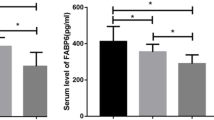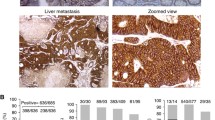Abstract
Background: Apoptosis or programmed cell death has been shown to play an important role in the progression from polyps to carcinomas. Fas/APO-1 is a cell surface protein that can induce apoptosis in a variety of cell types upon specific antibody binding. In this study seven human colorectal carcinoma (HCRC) cell lines of varying differentiation were analyzed for cell surface Fas expression, Fas-mediated apoptosis, and correlation of apoptosis withbcl-2 expression.
Methods and Results: Using flow cytometry, all seven lines expressed varying amounts of cell surface Fas antigen. Exposure to anti-Fas antibody induced cell death in all the cell lines, albeit to varying degrees. The rate of apoptosis was quantitated using flow cytometry with propidium iodide staining of nuclear DNA. The poorly differentiated cell lines had a significantly decreased (p<0.05) anti-Fas sensitivity as compared with the well-differentiated lines. Measurement ofbcl-2 expression by flow cytometry showed an inverse correlation with anti-Fas sensitivity.
Conclusions: This study confirms that HCRC cell lines express Fas antigen and, more importantly, provides the first evidence that exposure to anti-Fas antibody can induce apoptosis. Fas-mediated apoptosis in HCRC cell lines may be regulated bybcl-2 and may correlate with the degree of differentiation.
Similar content being viewed by others
References
Kerr JFR, Wyllie AH, Currie AR. Apoptosis: a basic biological phenomenon with wide ranging implications in tissue kinetics.Br J Cancer 1972;26:239–57.
Kerr JFR, Winterford CM, Harmon BV. Apoptosis: its significance in cancer and cancer therapy.Cancer 1994;73:2013–26.
Lowe S, Ruley HF, Jacks T, et al. p53 dependent apoptosis modulates the cytotoxicity of anti-cancer agents.Cell 1993;74:957–67.
Shaw P, Bovey R, Tardy S, et al. Induction of apoptosis by wild-type p53 in a human colon tumor derived cell line.Proc Natl Acad Sci U S A 1992;89:4495–9.
Reed JC.bcl-2 and the regulation of programmed cell death.J Cell Biol 1994;124:2–6.
Rasbridge SA, Gillett CE, Seymour AM, et al. The effects of chemotherapy on morphology, cellular proliferation, apoptosis and oncoprotein expression in primary breast carcinoma.Br J Cancer 1994;70:335–41.
Bursch W, Liehr JG, Sirbasku DA, et al. Control of cell death (apoptosis) by diethylstilbestrol in an estrogen dependent kidney tumor.Carcinogenesis 1993;12:855–60.
Garczyca W, Gary J, Ardelt B, et al. The cell cycle related differences in susceptibility of HL-60 cells to apoptosis induced by various anti-tumor agents.Cancer Res 1993;53:3186–92.
Staunton M, Gaffney EF. Tumor type is a determinant of susceptibility to apoptosis.Am J Clin Pathol 1995;103:300–7.
Aihara M, Scardino PT, Truong LD, et al. The frequency of apoptosis correlates with the prognosis of Gleason grade 3 adenocarcinoma of the prostate.Cancer 1995;75:522–9.
Mooney EE, Peris JMR, O'Neill A, et al. Apoptotic and mitotic indices in malignant melanoma and basal cell carcinoma.J Clin Pathol 1995;48:242–4.
Kasagi N, Gamyo Y, Shirai H, et al. Apoptotic cell death in human gastric carcinoma: analysis by terminal deoxynucleotidyl transferase-mediated dUTP-biotin nick end labeling.Jpn J Cancer Res 1994;85:939–45.
Sen S, D'Incalci M. Apoptosis: biochemical events and relevance to cancer chemotherapy.Fed Eur Biochem Soc 1992;307:122–7.
Itoh N, Yonehara S, Ishii A, et al. The polypeptide encoded by the cDNA for human cell surface antigen Fas can mediate apoptosis.Cell 1991;66:233–43.
Suda T, Takahashi T, Golstein P, et al. Molecular cloning and expression of the Fas ligand, a novel member of the tumor necrosis factor family.Cell 1993;75:1169–78.
Owen-Schaub L, Meterissian S, Ford RJ. Fas/APO-1 expression and function on malignant cells of hematologic and nonhematologic origin.J Immunother 1993;14:234–41.
Moller P, Koretz K, Leithauser F, et al. Expression of APO-1 (CD95) a member of the NGF/TNF receptor superfamily in normal and neoplastic colon epithelium.Int J Cancer 1994;57:371–7.
Meterissian SH, Toth CA, Steele G, et al. Kupffer cell/tumor cell interactions and hepatic metastases in colorectal cancer.Cancer Lett 1994;81:5–12.
Aiello A, Delia D, Barrello MG, et al. Flow cytometic detection of the mitochondrialbcl-2 protein in normal and neoplastic human lymphoid cells.Cytometry 1992;13:502–9.
Mosmann T. Rapid colorimetric assay for cellular growth and survival: application to proliferation and cytotoxicity assays.J Immunol Meth 1983;65:55–63.
Crompton T. IL-3 dependent cells die by apoptosis on removal of their growth factor.Growth Factors 1991;4:109–16.
Shi Y, Szalay MG, Paskar L, et al. Activation induced cell death in T cell hybridomas is due to apoptosis.J Immunol 1990;144:3326–33.
Sellins KS, Cohen JJ. Gene induction by γ-irradiation leads to DNA fragmentation in lymphocytes.J Immunol 1987;139:199–206.
Martin SJ, Lenman SV, Bonham AM, et al. Induction of apoptosis (programmed cell death) in human leukemic HL-60 cells by inhibition of RNA or protein synthesis.J Immunol 1990;145:859–67.
Collins RJ, Harmon BV, Sowles T, et al. Effects of cycloheximide on B-chronic lymphocytic leukemic and normal lymphocytes in vitro: induction of apoptosis.Br J Cancer 1991;64:518–22.
Cohen JJ. Programmed cell death in the immune system.Adv Immunol 1991;50:55–85.
Owens GP, Cohen JJ. Identification of genes involved in programmed cell death.Cancer Metastasis Rev 1992;11:149–56.
Enari M, Hug H, Nagata S. Involvement of an ICE-like protease in Fas-mediated apoptosis.Nature 1995;375:78–81.
Los M, Craen MV, Penning LC, et al. Requirement of an ICE/CED-3 protease for Fas/APO-1 mediated apoptosis.Nature 1995;375:81–3.
Itoh N, Nagata S. A novel protein domain required for apoptosis: mutational analysis of human Fas antigen.J Biol Chem 1993;268:10932–7.
Watanabe-Fukunuga R, Brannon C, Copeland N, et al. Lymphoproliferation disorder in mice explained by defects in Fas antigen that mediates apoptosis.Nature 1992;756:314–7.
Mapara MY, Bargou R, Zuyck C, et al. APO-1 mediated apoptosis or proliferation in human chronic B-lymphocytic leukemia: correlation withbcl-2 oncogene expression.Eur J Immunol 1993;23:702–8.
Itoh N, Tsujimoto Y, Nagata S. Effect ofbcl-2 on Fas antigen mediated cell death.J Immunol 1993;263:1759–62.
Cheng J, Zhan T Liu C, Shapiro J, et al. Protection from Fasmediated apoptosis by a soluble form of the Fas molecule.Science 1994;263:1759–62.
Leithauser F, Dhein J, Mechtersheimer G, et al. Constitutive and induced expression of APO-1, a new member of the NGF/TNF receptor superfamily in normal and neoplastic cells.Lab Invest 1993;69:415–29.
Author information
Authors and Affiliations
Rights and permissions
About this article
Cite this article
Meterissian, S.H., Kontogiannea, M., Po, J. et al. Apoptosis induced in human colorectal carcinoma by anti-fas antibody. Annals of Surgical Oncology 4, 169–175 (1997). https://doi.org/10.1007/BF02303801
Received:
Accepted:
Issue Date:
DOI: https://doi.org/10.1007/BF02303801




